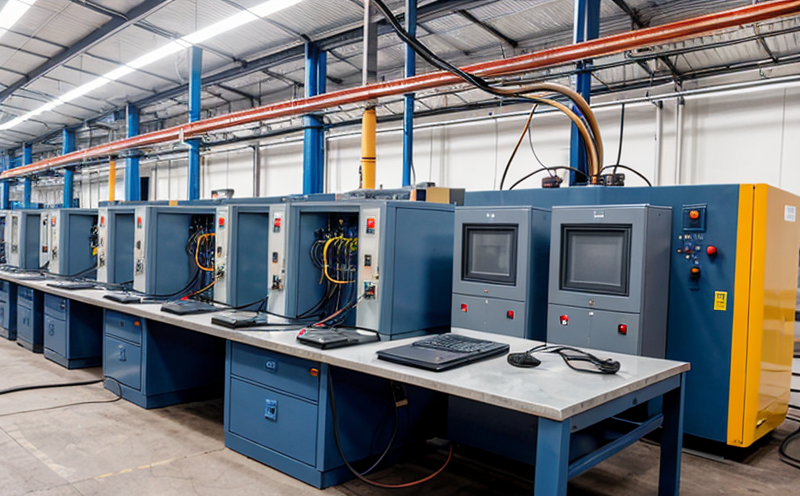IEC 60204 Safety Testing of Industrial Electrical Equipment
The IEC (International Electrotechnical Commission) Standard 60204-1 is a globally recognized safety guideline for electrical equipment used in industrial environments. This standard ensures that the electrical systems and devices used in manufacturing processes comply with stringent safety requirements to prevent accidents, injuries, or fatalities. The scope of this testing covers a wide range of electrical components such as motors, drives, controllers, sensors, and other critical pieces of machinery.
The IEC 60204-1 standard specifically addresses the protection against electric shocks for personnel in industrial environments. It provides detailed requirements for safeguarding workers from harmful currents that can lead to severe injuries or death. This includes provisions for isolating live parts, providing adequate spacing and clearance between electrical components, and ensuring effective grounding of equipment.
Testing according to IEC 60204-1 involves a series of rigorous procedures designed to simulate real-world conditions faced by industrial electrical systems. These tests are conducted on both individual components as well as entire assemblies to ensure they meet the necessary safety criteria. Some key aspects include:
- Evaluation of insulation resistance
- Testing for dielectric strength
- Verification of ground fault protection performance
- Assessment of overcurrent protection effectiveness
- Determination of short-circuit current capability
The testing process also involves close monitoring during operation to identify any potential hazards that may arise under normal working conditions. Compliance with IEC 60204-1 is essential for manufacturers aiming to ensure their products meet international standards and gain market entry into countries where these regulations are enforced.
For quality managers, compliance officers, R&D engineers, and procurement specialists responsible for industrial electrical equipment, understanding the nuances of this standard can greatly enhance product development timelines and reduce risks associated with non-compliance. By adhering to IEC 60204-1 guidelines during design phases, manufacturers can significantly improve safety features within their products.
Compliance testing according to IEC 60204-1 requires specialized laboratories equipped with state-of-the-art measurement tools and trained personnel capable of interpreting results accurately. It is crucial for ensuring that industrial electrical equipment not only functions correctly but also adheres strictly to safety norms set forth by international bodies like the IEC.
Quality and Reliability Assurance
Ensuring high levels of quality and reliability in industrial electrical systems is paramount when it comes to maintaining safe working environments. By conducting thorough testing according to IEC 60204-1, manufacturers demonstrate their commitment to delivering reliable products that can withstand harsh industrial conditions without compromising on safety.
The rigorous nature of these tests helps identify weak points early in the product lifecycle, allowing for timely corrections before mass production begins. This proactive approach ensures consistent performance across all units manufactured, leading to greater customer satisfaction and reduced warranty claims.
In addition to preventing accidents, adherence to IEC 60204-1 also contributes positively towards brand reputation by showcasing a company's dedication to worker safety. Companies that maintain strict compliance with international standards often receive favorable reviews from clients who appreciate the added assurance provided by certified products.
Regular audits conducted internally or externally help reinforce best practices within organizations, fostering continuous improvement initiatives aimed at further enhancing product quality and reliability over time.
International Acceptance and Recognition
The IEC 60204-1 standard enjoys widespread acceptance across many countries worldwide due to its comprehensive approach towards ensuring electrical safety in industrial settings. Many nations have adopted this standard as part of their national regulations governing the use of electrical equipment.
International recognition extends beyond mere compliance; it signifies a commitment to excellence that appeals not only to domestic markets but also opens doors for exporting products internationally. Certification based on IEC 60204-1 is often seen as an added value by potential buyers looking for dependable solutions capable of operating reliably under challenging circumstances.
For businesses operating globally, compliance with this standard can be a decisive factor in winning contracts and establishing long-term relationships with international clients. It demonstrates expertise in meeting stringent safety requirements while maintaining operational efficiency—a critical consideration in today’s competitive marketplace.
Frequently Asked Questions
Competitive Advantage and Market Impact
- Enhances brand reputation through adherence to global safety norms
- Promotes trust among customers who value worker safety and product reliability
- Fosters stronger relationships with international partners seeking compliant suppliers
- Increases market share by differentiating products from competitors who may not meet these stringent requirements
- Reduces risk of non-compliance penalties, recalls, and associated costs
- Simplifies compliance processes for regulatory bodies requiring proof of adherence to IEC standards
- Potentially leads to higher demand due to perceived increased value in products meeting international safety standards
By implementing IEC 60204-1 testing, companies not only protect their workforce but also position themselves as leaders in the field of industrial electrical equipment. This strategic approach contributes significantly to long-term success and sustainable growth within competitive markets.





